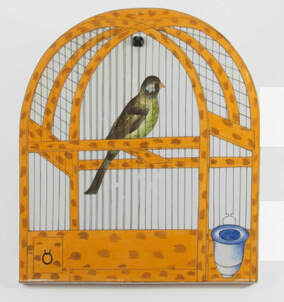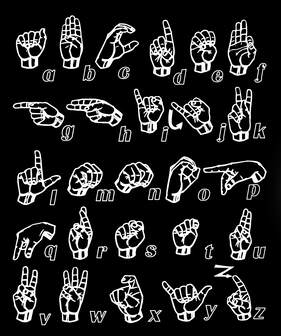The Boy Without A Name—And The Therapist Who Helped Him Understand That Objects Have Names4/14/2019  Philosopher Krishnamurti once commented that if you tell a boy the name of a bird he will never see the bird again, because he will believe he understands what a bird is by knowing its name. In other words, once it is named a "Robin" for example, it ceases to be a mysterious and wonderful flying creature in the mind of the boy. Thereafter he never sees the magnificent mystery that the bird truly is. He only sees a Robin. Krishnamurti’s profound statement suggests that we tend to reduce the wonder of the world by naming and objectifying everything. Long before human language evolved, birds, in this example, existed just fine without names. But giving them names and describing their features satisfies the human mind, which likes to categorize everything into neat rows of boxes called 'concepts'. But nothing could be said about any bird that could possibly encapsulate its true mystery. In the same way that your name and personal characteristics only describe the surface you. The deeper you is beyond categorization. Here’s The Flip Side I listened to a therapist being interviewed on KUOW, in Seattle. She was talking about helping a boy, Tony, understand that objects have names. Tony was 27, deaf and somewhat mentally challenged. The problem was that Tony was incapable of comprehending that things have names. Including himself. If the therapist pointed at him and signed "Your name is Tony." Tony would point at her and sign "Your name is Tony." And if she pointed at herself and signed “My name is Jill” Tony would point to himself and sign “My name is Jill.” No matter what she pointed at and named, Tony could only mimic back what she said.  Then she got the idea of communicating to an invisible person sitting in an empty chair so that Tony could observe her signing the names of things to the fictitious invisible person. Addressing the empty chair, she would point at an object in the room and sign what it was. Then she would go sit in the empty chair and sign back, to the now empty chair she had been sitting in before, that she understood the name of that object. Tony watched her do this over many sessions. Then one day Tony signed the question: “Does everything have a name?” And she signed “Yes”. And Tony go it. He looked around at all the things in the room and was stunned. His eyes widened, he slumped in his chair and began weeping. Because, according to the therapist, in that moment the world had instantly expanded for him. Everything in it suddenly had concrete meaning. From that point on Tony and the therapist conversed ravenously about all the things in his world. So as infants, before we developed language, things had no name. We looked at the world in wordless wonder. Then at some point we needed to develop language in order to get on in life, and we learned how to name things. But now, at this point in the evolution of human consciousness, even though we are capable of defining and naming everything, as we sometimes must, we are also capable of choosing not to. That is, to willingly leave experiences, people and things unnamed, unidentified and uncategorized. With a little intention and practice, we begin to experience the world differently. We begin to experience again the wordless wonder that we knew as a child and as the world truly is. See related posts: What Is A Tree? You Are Not Your Name You Are The universe
1 Comment
When I critique my student's artwork I try to be straightforward and not mince my words. I also compliment them frequently in a positive way because I wish to affirm their suspicion that their creative efforts are worthwhile. By complimenting them I am not flattering or pandering, I am validating and supporting their discovery and excitement about making art. So compliments are very useful in that way.
However, even some accomplished artists, who no longer need validation, like to be complimented too, just for having talent, which is a different thing. Compliments make him feel good, even important. It feeds the ego. The true artist—the artist who is interested in deeper things, will appreciate and enjoy another artist's artwork, but is never impressed because another artist is talented. Neither is he impressed with his own talent, nor depressed by the lack of it. Because he is not interested in personal comparisons. He is only interested in the dynamic creative flow that he is involved in. And he enjoys seeing how that same amazing movement expresses through other artists. His attention is so fully absorbed in that, there is no room for petty comparisons or boasting. Now, the worst thing a person could say about your artwork is not that it is bad, ugly or amateurish. Surprisingly, comments like that are often very useful, especially if they are thoughtful and informed. And if the work inspires an engaging conversation then that would be an indirect compliment . However, one of the worst thing a person could say to an artists while looking at their art is “Gee, you are so talented! What does it feel like to be so talented? I have no talent whatsoever. I could never do what you do . . . “ In other words, whatever beauty or interest the viewer initially saw in the artwork is instantly obliterated by their ego talking about itself in comparison to another person, the artist. They have completely missed the gift the artist has offered them. On the other hand, one of the best compliments comes without words. It is to observe a viewer's quiet absorption and curiosity as they look at your artwork. In that moment you are watching them experience what you experience as the artist. You want them to experience that same timeless curiosity about the world, without any thought of themselves or another. |
AuthorPatrick Howe, Artist, Author, Educator, Electronic Music Composer Blog Categories
|

 RSS Feed
RSS Feed
